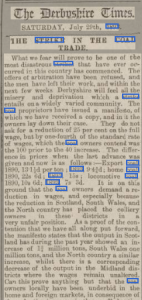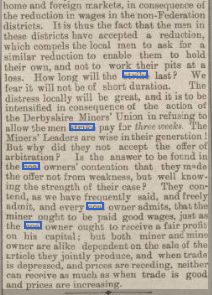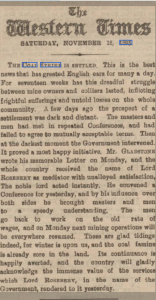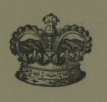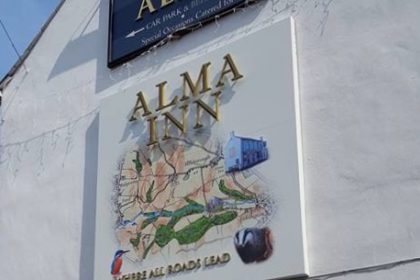What we fear will prove to be one of the most disastrous strikes that have ever occurred in this country has commenced.
The offers of arbitration have been refused, and the men have left their work, and within the next few weeks Derbyshire will feel all the misery and deprivation which a strike entails on a widely varied community. The coal proprietors have issued a manifesto, of which we have received copy, and in it the owners lay down their case. They do not ask for a reduction of per cent on the full wage, but one-fourth of the standard rate of wages, which the coal owners contend was the 100 prior to the 40 increase. The difference in prices when the last advance was given and now is follows : Export coal, 1890, 13 ½ d per ton ; 1893, 9 ¾ d; home coal, 1890, 22s 6d; 1893. 15s ; locomotive coal, 1890,10s 6d; 1893, 7s 3d.
It is on this ground that the coal owners demand a reduction in wages, and especially because the reduction in Scotland, South Wales, and the North country has placed the colliery owners in these districts in a very unfair position. As a proof of the contention that we have all along put forward, the manifesto states that the output in Scotland has during the past year showed an increase of I 3/4 million tons, South Wales one million tons, and the North country a similar increase, whilst there is a corresponding decrease of the output in the Midland districts where the wages remain unaltered.
Can this prove anything but that the coal owners locally have been underbid in the home and foreign markets, in consequence of the reduction in wages in the non-Federation districts. is thus the fact that the men in these districts have accepted a reduction, which compels the local men to ask for a similar reduction to enable them to hold their own, and not to work their pits a loss. How long will the strike last ?
We fear it will not be of short duration. The distress locally will be great, and it is to be intensified in consequence of the action of the Derbyshire Miners’ Union in refusing to allow the men strike pay for three weeks.
The Miners’ Leaders are wise in their generation But why did they not accept the offer of arbitration?
Is the answer to be found the coal owners’ contention that they made the offer not from weakness, but well knowing the strength of their case?
They contend, as we have frequently said, and freely admit, and every coal owner admits, that the miner ought to be paid good wages, just as the coal owner ought to receive a fair profit on his capital; but both miner and mine owner are alike dependent on the sale of the article they jointly produce, and when trade is depressed, and prices are receding, neither can receive as much as when trade is good and prices are increasing.
The Western Times SATURDAY, NOVEMBER 18, 1893.
The Coal Strike is settled. This is the best news that has greeted English ears for many days. For seventeen weeks has this dreadful struggle between mine owners and colliers lasted, inflicting frightful sufferings and untold losses on the whole community. A few days ago, the prospect of settlement was dark and distant. masters and men bad met repeated Conferences and had failed to agree to mutually acceptable terms.
Then at the darkest moment the Government intervened. proved a most happy initiative. Mr. Gladstone wrote his memorable Letter on Monday, and the whole country received the name of Lord Rosebery aa mediator with unalloyed satisfaction. The noble lord acted instantly. He convened a Conference for yesterday, and by influence over both aides he brought masters and men to a speedy understanding.
The men go back work on that old rate of wages, and on Monday next mining operations will be everywhere resumed.
These are glad tidings indeed, for winter is upon us, and the coal famine is already sore in the land. Its continuance is happily averted, and the country will gladly acknowledge the immense value of the services Lord Rosebery, in the name of the Government, rendered to it yesterday.
Copywrite British Newspaper Archives

